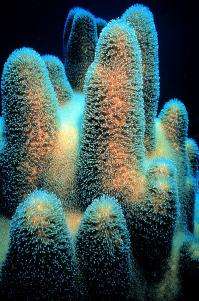January 8, 2013 report
Researchers use DNA sequencing to learn why some corals are more heat tolerant

(Phys.org)—Researchers working out of the Hopkins Marine Station at Stanford University have found that the ability of some corals to withstand higher water temperatures appears to be gene based. In their paper published in the Proceedings of the National Academy of Sciences, the group outline how they compared two types of corals commonly found in a reef in American Samoa, and found that those that are more heat resistant tend to express more gene types during normal temperature conditions.
Scientists the world over agree that global atmospheric temperatures are rising and along with them are rising ocean temperatures. Because of this, those who study the seas and the organisms that live in them have been scrambling to try to find tools to help discern which will be impacted by rising temperatures and which won't. Doing so might help direct conservation efforts.
In this new research, the researchers looked to reefs off Ofu Island in American Samoa for help. Because of unique physical characteristics, pools of water exist at different temperatures and some experience extreme temperature variations on a daily basis. In studying the corals that live there, the team discovered that some of the corals did poorly as temperatures rose, while others seemed to thrive – this despite being very closely related. Suspecting that an answer might lie in their gene pool, the researchers collected some samples and took them back to their lab.
The samples were put in water tanks and subjected to variable water temperature fluctuations. Each was also tested for gene expression via RNA testing using a technique known as Illumina sequencing. In studying the results of their analysis, the researchers found that all of the corals expressed hundreds of genes when exposed to higher than normal temperatures. But they also found that those that were more heat resistant also expressed approximately 60 of those same genes during normal temperature exposure as well – the team refers to this as "front-loading." They suggest that the corals give themselves the upper hand in dealing with environmental changes by expressing more genes during normal times that might help in dealing with whatever changes may come about.
The team suggests their findings may help with future conservation efforts as ocean temperatures continue to rise. By focusing resources on those most likely to survive, the hope is that more sea creatures can be saved in the long run.
More information: Genomic basis for coral resilience to climate change, PNAS, Published online before print January 7, 2013, doi: 10.1073/pnas.1210224110
Abstract
Recent advances in DNA-sequencing technologies now allow for in-depth characterization of the genomic stress responses of many organisms beyond model taxa. They are especially appropriate for organisms such as reef-building corals, for which dramatic declines in abundance are expected to worsen as anthropogenic climate change intensifies. Different corals differ substantially in physiological resilience to environmental stress, but the molecular mechanisms behind enhanced coral resilience remain unclear. Here, we compare transcriptome-wide gene expression (via RNA-Seq using Illumina sequencing) among conspecific thermally sensitive and thermally resilient corals to identify the molecular pathways contributing to coral resilience. Under simulated bleaching stress, sensitive and resilient corals change expression of hundreds of genes, but the resilient corals had higher expression under control conditions across 60 of these genes. These "frontloaded" transcripts were less up-regulated in resilient corals during heat stress and included thermal tolerance genes such as heat shock proteins and antioxidant enzymes, as well as a broad array of genes involved in apoptosis regulation, tumor suppression, innate immune response, and cell adhesion. We propose that constitutive frontloading enables an individual to maintain physiological resilience during frequently encountered environmental stress, an idea that has strong parallels in model systems such as yeast. Our study provides broad insight into the fundamental cellular processes responsible for enhanced stress tolerances that may enable some organisms to better persist into the future in an era of global climate change.
Journal information: Proceedings of the National Academy of Sciences
© 2013 Phys.org



















